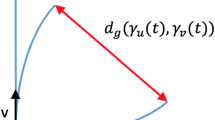Abstract
Quantum optimal transportation seeks an operator which minimizes the total cost of transporting a quantum state to another state, under some constraints that should be satisfied during transportation. We formulate this issue by extending the Monge–Kantorovich problem, which is a classical optimal transportation theory, and present some applications. As an example, we address infinitely repeated quantum games and establish the folk theorem of the quantum prisoners’ dilemma, which claims mutual cooperation can be an equilibrium of the infinitely repeated quantum game. We also exhibit a series of examples which show generic and practical advantages of the abstract quantum optimal transportation theory.


Similar content being viewed by others
References
Monge, G.: Mémoire sur la théorie des déblais et des remblais, Histoire de l’Académie Royale des Sciences de Paris 666 (1781)
Eisert, J., Wilkens, M., Lewenstein, M.: Quantum games and quantum strategies. Phys. Rev. Lett. 83, 3077 (1999). arxiv:quant-ph/9806088
Meyer, D.A.: Quantum strategies. Phys. Rev. Lett. 82, 1052 (1999). arxiv:quant-ph/9804010
Li, Q., Chen, M., Perc, M., Iqbal, A., Abbott, D.: Effects of adaptive degrees of trust on coevolution of quantum strategies on scale-free networks. Sci. Rep. 3, 2949 (2013)
Li, Q., Iqbal, A., Perc, M., Chen, M., Abbott, D.: Coevolution of quantum and classical strategies on evolving random networks. PloS One 8, e68423 (2013)
Shah Khan, F., Solmeyer, N., Balu, R., Humble, T.: Quantum games: a review of the history, current state, and interpretation, arXiv e-prints (2018). arXiv:1803.07919
Abreu, D.: On the theory of infinitely repeated games with discounting. Econometrica 56, 383 (1988)
Fudenberg, D., Maskin, E.: The folk theorem in repeated games with discounting or with incomplete information. Econometrica 54, 533 (1986)
Iqbal, A., Toor, A.H.: Quantum repeated games. Phys. Lett. A 300, 541 (2002). arxiv:quant-ph/0203044
Frackiewicz, P.: Quantum repeated games revisited. J. Phys. A Math. Gen. 45, 085307 (2012). arxiv:1109.3753
Kadowaki, T., Nishimori, H.: Quantum annealing in the transverse Ising model. Phys. Rev. E 58, 5355 (1998)
Johnson, M.W., Amin, M.H.S., Gildert, S., Lanting, T., Hamze, F., Dickson, N., et al.: Quantum annealing with manufactured spins. Nature 473, 194 (2011)
Ikeda, K., Nakamura, Y., Humble, T.S.: Application of quantum annealing to nurse scheduling problem. Sci. Rep. 9, 12837 (2019)
Ikeda, K.: Universal Computation with Quantum Fields, arXiv e-prints (2019). arXiv:1910.02833
Kantorovich, L.: On the transfer of masses. Dokl. Acad. Nauk. USSR 37, 199 (1942)
Meyer, D.A.: From quantum cellular automata to quantum lattice gases. J. Stat. Phys. 85, 551 (1996)
Nash, J. F.: Equilibrium points in n-person games, Proceedings of the National Academy of Sciences 36 (1950) 48. https://www.pnas.org/content/36/1/48.full.pdf
Compte, O.: On failing to cooperate when monitoring is private. J. Econ. Theory 102, 151 (2002)
Matsushima, H.: On the theory of repeated games with private information: part i: anti-folk theorem without communication. Econ. Lett. 35, 253 (1991)
Caglioti, E., Golse, F., Paul, T.: Quantum optimal transport is cheaper, arXiv e-prints (2019). arXiv:1908.01829
Acknowledgements
I thank Travis Humble for useful discussion about quantum computation and game theory. I came up with an idea of showing the folk theorem while I discussed with him. Also, I was benefited by discussing with Katsuya Hashino, Kin-ya Oda, and Satoshi Yamaguchi. The author was partly supported by Grant-in-Aid for JSPS Research Fellow, No. 19J11073.
Author information
Authors and Affiliations
Corresponding author
Additional information
Publisher's Note
Springer Nature remains neutral with regard to jurisdictional claims in published maps and institutional affiliations.
Rights and permissions
About this article
Cite this article
Ikeda, K. Foundation of quantum optimal transport and applications. Quantum Inf Process 19, 25 (2020). https://doi.org/10.1007/s11128-019-2519-8
Received:
Accepted:
Published:
DOI: https://doi.org/10.1007/s11128-019-2519-8




